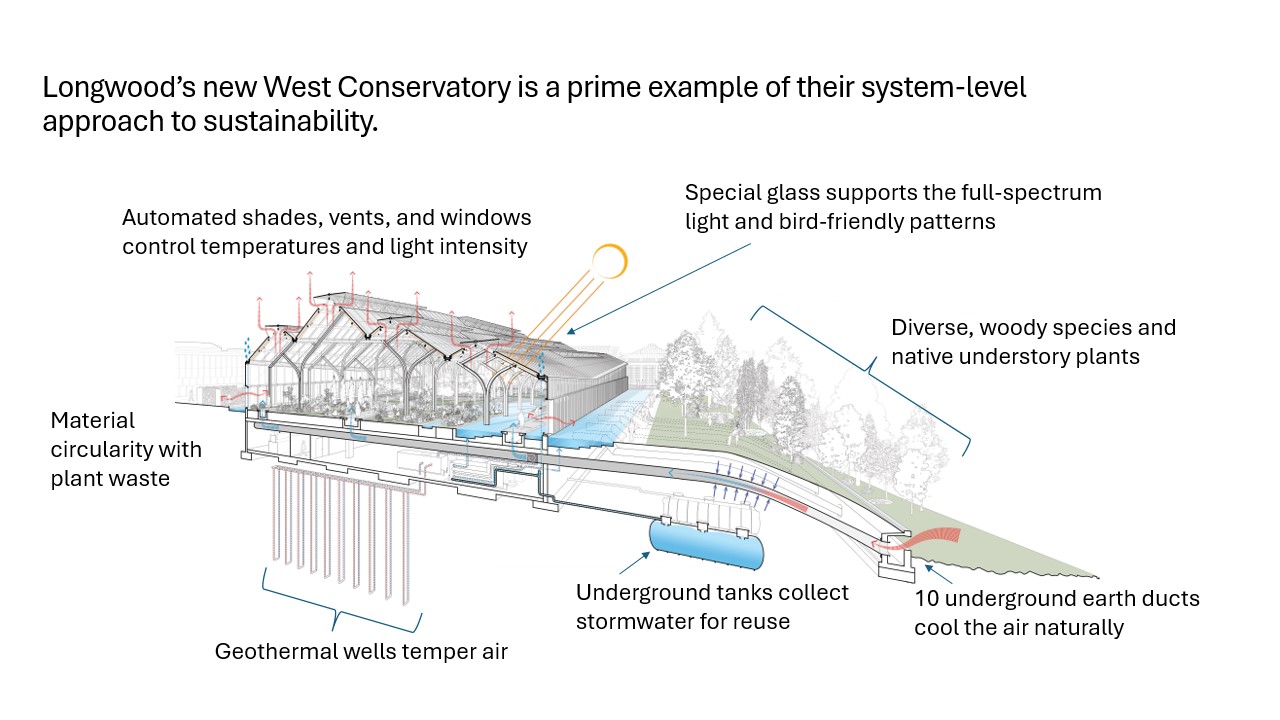
By: Jessica Turner-Skoff, Ph.D., Associate Director, Science Communications, Longwood Gardens and Rachel Novick, Ph.D. LEED AP, Director of Sustainability, The Morton Arboretum
One of the most powerful impacts our institutions can make in sustainability is to educate and inspire our guests and members to take action in their own lives. By modeling practical, site-based sustainability efforts, arboreta and gardens serve as living examples of how environmental responsibility is both achievable and essential. The following examples highlight such initiatives at two ArbNet level IV institutions, Longwood Gardens and The Morton Arboretum, but these practices are scalable to adjust for different arboretum sizes, types, and capacities.
Longwood Gardens (Pennsylvania) demonstrates a strong commitment to sustainability across its gardens, facilities, and natural lands. From maximizing the value of water, an approach that is known as ‘One Water’, to innovating practices that reduce its carbon footprint and improve material circularity, Longwood prioritizes sustainability. The stories of these efforts are thoughtfully integrated into the guest experience through in-garden content and experiences, classes, and garden management. For example, Longwood’s Soils and Composting team transforms nearly 18,000 cubic yards of “green waste”—equivalent to nearly two acres covered six feet deep—into compost and mulch that support garden operations. Fallen trees become mulch, or the wood is reused for garden furnishings or products in the Garden Shop. Fallen leaves become nutrient-rich amendments.

Courtesy of Longwood Gardens
A recent example of this closed-loop system can be found in the Idea Garden, which combines ornamental and edible plantings, and supports both a local food bank and the Gardens’ on-site fine-dining restaurant, 1906. Guests walk along paths in the Idea Garden mulched with recycled trees while admiring produce that will likely make it onto tomorrow’s menu. Kitchen and garden waste are collected, composted on-site, quality-tested, and returned to the soil—the beauty of yesterday feeding the gardens of tomorrow. The cycle comes full circle in Longwood’s Garden Shop, where guests can purchase certified compost to enrich their own gardens.
The Morton Arboretum (Illinois) utilizes its 1,700 acres of collections, gardens, and natural areas as a living laboratory to educate the public and to conduct conservation research. The Arboretum offers a wide variety of courses that support a sustainable lifestyle on topics such as backyard composting, food forest design, seed saving, growing prairie gardens, and beekeeping. Visitors are able to experience the benefits of these practices by exploring the Arboretum’s 750 acres of forest, 100 acres of tallgrass prairie, edible gardens, and beehives. All landscape waste is converted to compost on site, and fallen trees are used to build furniture, mulched, or sold to artisans at an annual “Wood Slab Sale”.

Visitors to the Arboretum also have numerous opportunities to engage with active research programs that take place in conservation groves and research plots found throughout the landscape. Students and citizen scientists work alongside researchers to drive progress on much-needed research in biodiversity conservation, sustaining urban trees and forests, and ecosystems restoration. Visitors learn about how this research informs forest management practices through both interpretation and guided programs.
Gardens and arboreta have diverse opportunities to educate the public about sustainability, each in their own unique way. In our experience, the key ingredient for success is a commitment to bringing “behind the scenes” activities into the foreground and utilizing them as authentic learning tools. These activities might include composting operations, research programs, irrigation systems, or the inner workings of an energy efficient building. When we lead by example, we make the most of our opportunities to inspire lasting change beyond our gates.

